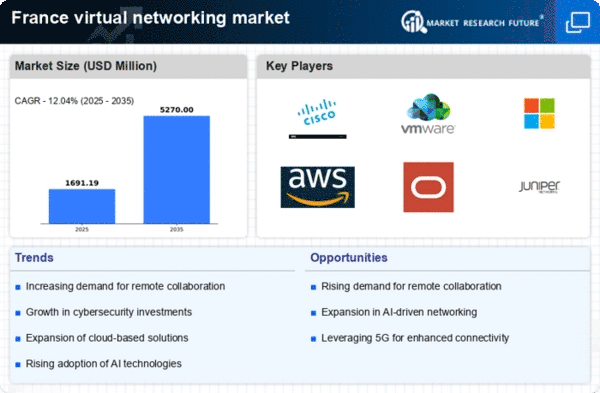Expansion of 5G Technology
The rollout of 5G technology is poised to transform the virtual networking market in France. With its promise of faster data speeds and lower latency, 5G is expected to enhance the performance of virtual networking solutions. By 2025, it is projected that 5G coverage will reach 80% of urban areas in France, enabling businesses to leverage high-speed connectivity for their virtual networking needs. This technological advancement may lead to the development of more sophisticated networking applications, further driving the growth of the virtual networking market. As organizations capitalize on the benefits of 5G, the demand for innovative virtual networking solutions is likely to increase.
Increased Investment in Cybersecurity
The virtual networking market in France is witnessing a heightened focus on cybersecurity measures. As cyber threats become more sophisticated, organizations are compelled to enhance their security protocols to protect sensitive data and maintain customer trust. In 2025, it is anticipated that cybersecurity spending in France will reach €10 billion, with a significant portion allocated to securing virtual networking infrastructures. This trend underscores the critical role of cybersecurity in the virtual networking market, as businesses seek to implement secure networking solutions that mitigate risks and ensure compliance with regulatory standards. The demand for secure virtual networking tools is likely to grow as organizations prioritize data protection.
Emergence of Hybrid Cloud Environments
The shift towards hybrid cloud environments is significantly impacting the virtual networking market in France. Organizations are increasingly adopting hybrid models that combine on-premises infrastructure with cloud services, necessitating advanced virtual networking solutions to ensure seamless integration and data flow. In 2025, it is estimated that over 50% of French companies will operate in hybrid cloud environments, creating a substantial demand for virtual networking tools that facilitate connectivity across diverse platforms. This trend highlights the importance of the virtual networking market in supporting businesses as they navigate the complexities of hybrid cloud architectures, ultimately driving innovation and growth in the sector.
Rising Demand for Remote Work Solutions
The virtual networking market in France is experiencing a notable surge in demand for remote work solutions. As organizations increasingly adopt flexible work arrangements, the need for robust virtual networking tools has become paramount. In 2025, it is estimated that approximately 40% of the workforce in France will engage in remote work, driving the necessity for reliable and secure networking solutions. This shift is compelling businesses to invest in virtual networking technologies that facilitate seamless communication and collaboration among remote teams. The virtual networking market is thus positioned to benefit from this trend, as companies seek to enhance productivity and maintain operational efficiency in a distributed work environment.
Growing Emphasis on Digital Transformation
Digital transformation initiatives are significantly influencing the virtual networking market in France. Organizations are increasingly recognizing the importance of integrating advanced technologies to improve operational efficiency and customer engagement. In 2025, it is projected that over 60% of French enterprises will prioritize digital transformation strategies, which include the adoption of virtual networking solutions. This trend indicates a shift towards more agile and responsive business models, where virtual networking plays a crucial role in enabling connectivity and collaboration. The virtual networking market is likely to thrive as companies invest in innovative networking solutions to support their digital transformation journeys.
















